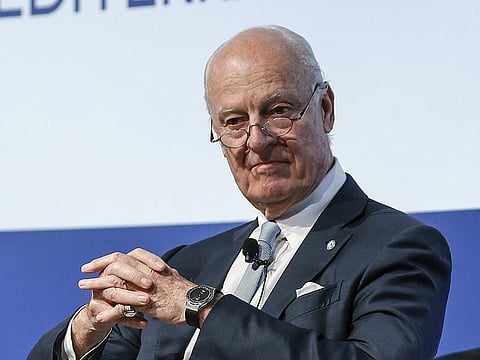Finding a political solution to Syrian conflict
New round of Astana talks will focus on forming the Syrian constitutional committee

At first glance there is very little to expect — if anything — from the next round of Syrian peace talks in Astana, scheduled for November 28-29. The UN-independent process was never intended to reach a political agreement, after all, but only to manage battlefield dynamics during the bloody Syrian conflict. This time, however, the outcome might be different, coming days after two of Astana’s guarantors, Recep Tayyip Erdogan and Vladimir Putin, met in Istanbul on November 19, and just days before Putin meets with his US counterpart Donald Trump at the G20 Summit in Argentina on December 2.
The pride and joy of earlier Astana rounds were the four “de-conflict” zones east of Damascus, north of Homs, south of Dera’a, and in Idlib province in the Syrian northwest. They were agreed upon by the three guarantors, Russia, Turkey and Iran, in May 2017. With the notable exception of Idlib, these battles are all over now, won by the Syrian and Russian armies earlier this year. A “de-militarisation agreement” was reached over Idlib last September, hammered out between Erdogan and Putin.
That agreement has not gone well, to say the least. Erdogan had promised to liberate the area from Jabhat Al Nusra and Daesh by mid-October. That did not happen. Nor was it cleared of all heavy weapons. Erdogan had sought clemency for 70,000 fighters on the Turkish payroll, saying that they would handle the war on terror in Idlib but neither Damascus nor Moscow have agreed to do that.
When they met with the leaders of Germany and France in Istanbul last month, Erdogan and Putin agreed to give Idlib another chance in order to avoid another battle, one that undoubtedly would trigger more refugees flocking into Europe. That four-way agreement needs to translate into action this month at Astana. A new deadline is yet to be set for evacuation of terrorist groups, with clear terms of reference, a mechanism for monitoring violations, and a Plan B, should Turkey fail to pull through with its commitments.
Politically, leaders of the Istanbul Summit also agreed to create a constitutional committee for Syria before the end of this year, in accordance with UNSCR 2254. Although no mention of decapitation was made, and the entire notion of a Transitional Government Body was dropped (as stated in Geneva I) Putin was not too happy with his German and French counterparts sticking their nose in a matter he now considers purely “Russia’s business.”
Unwillingly, he played along with their given deadline but plans to manipulate the process and produce an acceptable charter compatible with his vision of the Syrian endgame. For starters, the constitutional committee was supposed to be part of the now almost dysfunctional Geneva process, one that the Russians worked very diligently on aborting, considering it a brainchild of former US Secretary of State John Kerry.
Putin wants the Syrian constitution to be born out of Astana, not Geneva, using the UN-mandated talks to give the constitutional committee legitimisation — or a stamp of approval — without interfering in its daily work.
Forming the committee is one thing and getting started is another. Addressing the Security Council two days ago, outgoing UN envoy Staffan De Mistura said that he hopes the committee will begin work next month. A basket of unanswered questions will have to be settled in Astana, however, like where the committee will meet, who its final members will be, and whether its deliverables will be a new constitution, or a modified charter. The Syrians want the committee to meet in Damascus, but the opposition is insisting on neutral Geneva. Putin wants the talks either in Moscow or Sochi — or Astana.
At present, the committee is to be formed of 150 members: 50 for the Syrian Government, 50 for the Syrian Opposition, and 50 for “civil society,” to be named by De Mistura. The Syrians have already rejected giving De Mistura the authority to name the third list, saying that his role ought to be that of “facilitator” not “decision-maker.” The three organising states at Astana want to maintain that exclusivity for themselves, wrestling it out of the UN’s hands. There is also confusion on what the committee’s job will be. Damascus believes that it ought to “review” the constitution only, without actually amending it or writing a new one, but neither the UN nor the opposition have agreed to that, insisting on full right to pen a new charter. A draft constitution put forth by Russian lawmakers in mid-2016 was flatly rejected because it withdrew 23 ceremonial rights from the presidency, while maintaining the authority to head the security and armed forces. It also called for creating local parliaments throughout the country, with an upper and lower chamber with full legislative powers. That too has been rejected by Damascus. Meanwhile, the opposition opposed a suggestion for scrapping Article 3, which specifies the president’s religion as Islam, and is unhappy with the fact that the president of the republic gets to continue heading the military apparatus.
These are no small issues. Putin can meet the December 2018 deadline, but due to Christmas holidays just around the corner, the committee will only start work in 2019. That is when the Russians and their Syrian allies can drown the talks in nitty-gritty details, unless of course, they are handled via Astana and produce a constitution deemed “acceptable” to its three guarantors.
Sami Moubayed is a Syrian historian and former Carnegie scholar. He is also the author of Under the Black Flag: At the frontier of the New Jihad.


